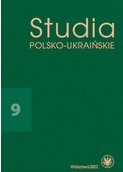„Ксьондзи-єзуїти” в унійному проєкті та романтичному міті
“Jesuit Priests” in a union project and a romantic myth
Author(s): Ihor IsichenkoSubject(s): Christian Theology and Religion, History of Church(es), Comparative Studies of Religion, 16th Century, Eastern Orthodoxy, History of Religion
Published by: Wydział Lingwistyki Stosowanej Uniwersytetu Warszawskiego
Keywords: romanticism; myth; Taras Shevchenko; polemics; Benedict Herbest; Piotr Skarga; the Union of Brest;
Summary/Abstract: The reception of relations between the Orthodox and Catholic Churches by the Ukrainian national consciousness was largely formed by a romantic myth. It appeared in the works by Taras Shevchenko, in the documents of the Brotherhood of Saints Cyril and Methodius. According to this myth, the Church Union of Brest (1596) was the result of the colonial policy of the Polish government and the intrigues of the Jesuit priests. In fact, the influence of the royal administration on the religious life of the inhabitants of the Polish-Lithuanian state was extremely limited. „Henrician Articles” of 1573 forced the king to adhere to religious tolerance and to recognize the nobility’s right to free choice of religion. The Roman Catholic clergy, for the most part, did not want to grant Christians the Eastern rite of parity. The Society of Jesus, which formed a separate province in the Polish-Lithuanian Commonwealth in 1574, was guided not by political but by religious motives. Benedict Herbest (1531–1598) already in his work „Wypisanie drogi” („The Desribing of The Way”, 1566) discusses the prospect of restoring unity with the Orthodox Ruthenians. In the book „Wiary Kościołu Rzymskiego wywody” („The Arguments of the Roman Church’ Belief”) he explains Ruthenia’s departure from unity with Rome by lack of education and low religious consciousness. Piotr Skarga (1536–1612) wrote the book „O jedności Kocioła Bożego” („About the God’s Church’s Unity”, 1577), when he had not great authoruty in the Church and when he was little known in society.
Journal: Studia Polsko-Ukraińskie
- Issue Year: 2022
- Issue No: 9
- Page Range: 39-53
- Page Count: 15
- Language: Ukrainian

